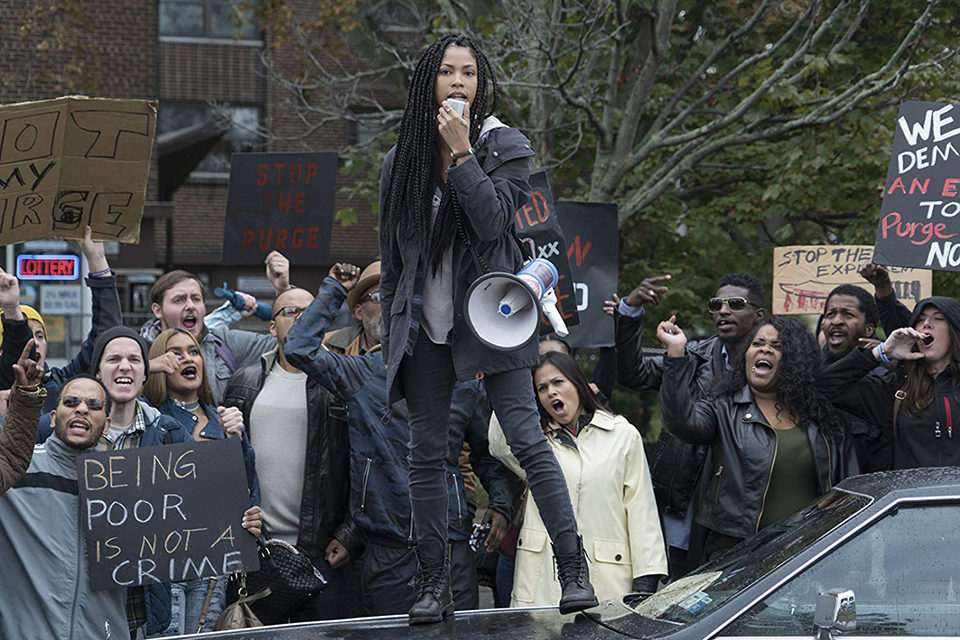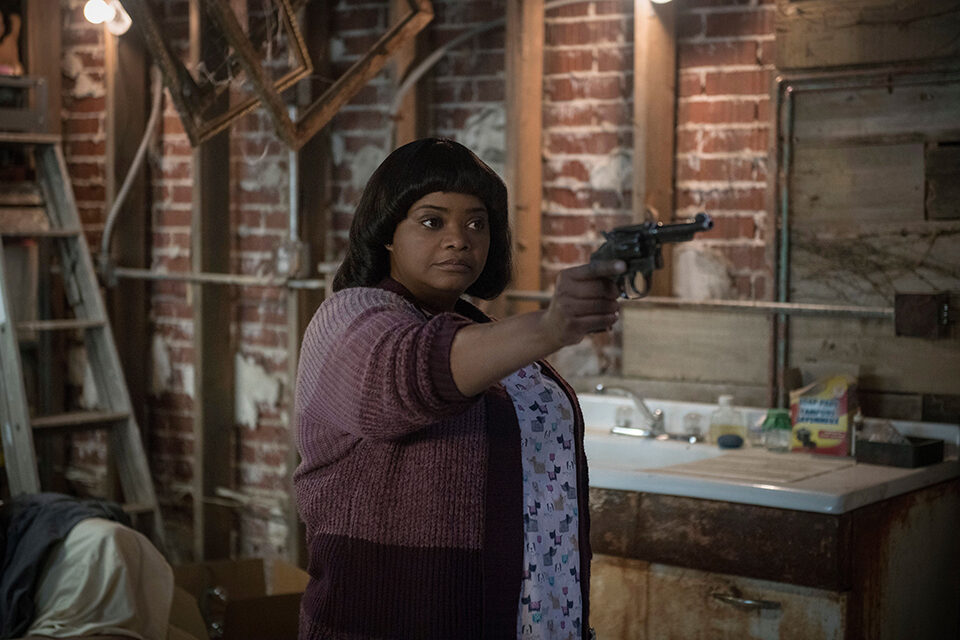By Soraya Nadia McDonald in the September-October 2019 Issue

Scare Tactics: Just Business
Hyped hitmaker Blumhouse steadily continues to invest in black creators
When actor and Don’t Let Go co-producer David Oyelowo first got his hands on an initial script and decided he wanted to make it, there were some changes that needed to happen. First, it needed to be moved out of rural Ohio, where it was originally set. And second, if Oyelowo was going to star as Jack Radcliff—a police officer whose niece, brother, and sister-in-law are murdered—the family would have to be black rather than white. And because his producing partner was Jason Blum of Blumhouse Productions, this was no big deal.

From the September-October 2019 Issue
Also in this issue
“He gives creative autonomy to his filmmakers and his actors on a level that is so extraordinary and wonderful, and you can see it in the work,” Oyelowo said in a recent phone interview. “I saw that firsthand with our film and how well-nurtured [director] Jacob Estes was.”
Oyelowo, who also co-produced Amma Asante’s A United Kingdom, added a bit more bluntly: “At no point did we feel like it’s the studio’s way or the highway, which can definitely be the way in certain studio situations.”
“It’s a capital-intensive art form, so when you throw money into the arts it gets messy and murky,” Blum said when reached by phone. “The coexistence of art and money is always difficult. Television and movies are at the nexus of art and commerce, in a very different way than painting, or writing a book, or even putting on a play. We try hard to make it less murky, but we don’t always succeed. We do better than most, and I think that’s what David’s responding to.”

Don't Let Go (Jacob Aaron Estes, 2019). Courtesy of Lacey Terrell/Universal Pictures.
By now the reputation of Blumhouse and its founder is well-established: a studio that makes adrenaline-pumping horror and thrillers on small budgets, and then rakes in enormous returns on investments when something does well. When high-profile actors sign on to Blumhouse projects, they may not make much up front, but if the film wildly exceeds expectations, their back-end cut of the profits can be quite respectable. That was what initially turned heads about Blum and his business model: he seemed to be better at managing risk than the big studios, in part because the fate of Blumhouse’s financial health is not contingent upon the success of a few enormous tentpoles. Blum famously made Paranormal Activity for $15,000. It grossed more than $193 million, making it the most profitable film in movie history.
But lately, Blumhouse has also been part of a renaissance in black horror, due in large part to the coronation of Jordan Peele, the writer-director of the Blumhouse-produced Get Out and Us, as the nation’s latest heir to the legacy of Alfred Hitchcock. Blum and Peele serve as twin ambassadors for the idea that wide-release horror is and can be more than just B-movie schlock, and that horror films by and about minorities need not be niche; with the 10-year deal Blum signed with Universal in 2014, they have a vehicle to deliver those ideas to the masses. Both Get Out and Us revealed a large-scale hunger for horror that directly confronts race-based discrepancies in America and actually features black leads.
That approach extends beyond Peele, too, as evidenced by The First Purge, the fourth film in the Purge franchise. Released in 2018, The First Purge reveals that the idea for a 12-hour crime free-for-all originated with a motive grounded in white supremacy: to rid the nation of those who are non-white and poor. In other words, what might constitute horror to some is actually a Ken Cuccinelli fever dream taken to extremes. So when writer-director Numa Perrier began musing about her next film project after her first feature, Jezebel, had its debut at South by Southwest in 2019, Blum and Peele were at the top of her wish list of collaborators. It’s a thriller, inspired by her own life, about a tug-of-war between an adoptive mother and a biological one.

The First Purge (Gerard McMurray, 2018). © Universal Pictures.
“Through my work, it’s been revealed to me that injustice really drives me crazy and really, really bothers me. We’re not going in the right direction in the U.S. on that front, so it’s top of mind,” Blum said. “A lot of people say they make movies color-blind, but I don’t think that they really do. Now that we’ve done it a lot, we do it more—putting African-American actors in parts that aren’t written [for them]—it doesn’t say ‘white man’ or ‘white woman,’ but when you’re white and you’re reading it, you’re assuming that that’s what it is. Almost everything we do can be any race.”
Don’t Let Go, Blumhouse’s latest offering, premiered at Sundance (Blum recently joined the Sundance Institute’s Board of Trustees) under the title Relive. The story follows Jack as he realizes that he and his murdered niece Ashley (Storm Reid) are actually living in two different timelines, connected by their smartphones. He has an opportunity to save Ashley, who is still alive in a parallel world two weeks earlier. The plot is complicated by the fact that Jack is a police officer and his brother (an underused Brian Tyree Henry) is an ex-con trying to live on the right side of the law.
Blumhouse’s other releases this year have included Ma, Octavia Spencer’s first starring role in a decades-long acting career. Instead of yet another helpmeet nurturing a white person on their journey to Be a Better Person, Ma was diabolical, unhinged, downright sociopathic. Like Jack Radcliff, she too was originally written as a white woman. The company also produced Sweetheart, which stars Kiersey Clemons as a young woman stuck on an uninhabited island in Fiji. It, too, debuted at Sundance, and is slated for a 2019 release. Clemons’s Jennifer doesn’t speak much, and she carries the movie alone as a survivor trying to avoid and outwit a nocturnal bloodthirsty sea monster. Not so different from The Shallows, which starred Blake Lively, except for the fact that the film was a vehicle for a young black potential scream queen.

Sweetheart (J.D. Dillard, 2019). Courtesy of the Sundance Institute.
“There’s a deep bench of underutilized African-American talent. We’ve been opportunistic. We do it because it’s good business. We don’t do it because we’re saints,” Blum said. “We’re in the business of trying to make great movies and great TV shows and one way to do that is to work with more African-American actors than most Hollywood companies do.”
That’s not to say that Blum and his production company are without faults. He’s been criticized for his penny-pinching approach when his films don’t get theatrical releases or even a shot to recoup their costs through video-on-demand release. In a 2018 interview with Polygon, he said there were “not a lot of women directors” and that there are “even less who are inclined” to direct horror, as an explanation for why his company had not produced and theatrically released a woman-helmed horror film. (Blum is not involved in the Peele-produced remake of Candyman, which Nia DaCosta is directing.)
He did do better: Blumhouse tapped Sophia Takal to direct a remake of the 1974 horror film Black Christmas. Another, Run Sweetheart Run, from Shana Feste, is in postproduction, and a remake of The Craft directed by Zoe Lister-Jones is in production. But it’s also been pointed out that his projects don’t always deliver on the politics a film’s representational bona fides seem to be gesturing toward. Ma is divorced from any larger historical context of the legacies of American racial inequality, and Don’t Let Go steers clear of exploring long-standing rifts between black people and law enforcement and how they might influence Jack’s relationship with his brother. Sorry to Bother You director Boots Riley has bashed the Blum-produced BlacKkKlansman for going too easy on racial biases of police officers.

Ma (Tate Taylor, 2019). Photo by Anna Kooris/Universal/Kobal/Shutterstock.
“We explored racial inequality in BlacKkKlansman. We explored it in Get Out, but I think it’s very limiting to suggest if you have an African-American actor in a movie, you should explore racial inequality,” Blum said. “I think that’s one of the reasons, in the past, that there have not been as many opportunities for African-American actors as there should be. I think it’s very unfortunate to think if I’m gonna have a black actor in a movie somehow I have to talk about race in that movie. I’m proud that some of our movies are about race and have black actors in them. Some of our movies are not about race at all and have black actors in them.”
One secret to Blum’s success seems to be that he listens and that he’s tempered the instinct to respond defensively when criticized. In a town filled with men with God complexes, he’s aware of his own fallibility, and that has made all the difference.
Soraya Nadia McDonald is the culture critic for The Undefeated.







